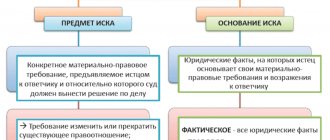Where to go first?
If there is a need to remove a child from an apartment by court, first obtain two documents:
- Certificate of persons registered in the apartment. It will indicate exactly who is registered, from what time and in what relationship with the owner of the property. This document must be attached to the claim with a request to discharge the minor from the living space. You can get a certificate from the Criminal Code, Homeowners Association, passport office at your place of residence, or the police department.
- An extract from the Unified State Register of Real Estate about registered rights to the apartment. Thanks to her, it will become clear whether this child is the owner or just lives in the apartment. If the owner, it is impossible to write it out through the court.
Armed with these documents, you can begin preparing documents for the court. To do this, you need to decide on the grounds for the discharge (they must be specific and significant), the legislative framework and evidence in the case.
Reasons for termination of registration for a minor child
The housing rights of children under 18 years of age are protected by Russian legislation and should not be infringed. There is an obligation to register (register) children no later than one month from the date of birth. Registration is carried out in municipal or private housing. Children are removed from registration only when there are certain reasons for this . It could be:
- parental divorce;
- sale of one living space and purchase of another;
- moving to another locality when the family changes its place of residence.
Our editors advise you to familiarize yourself with the features of obtaining an urban planning plan for a land plot.
Who is right?
A lot of situations may arise when a minor child remains registered in the apartment. For example, the seller moved with his family from their home to a new apartment, but did not release the children because guardianship did not allow him.
It is difficult to discharge a child through the court, but it is possible. As you prepare for trial, keep a few things in mind:
- young children (under 14 years old) must be registered with their parents;
- It will not be possible to discharge the child “to nowhere”; you will have to look for an alternative address or prove that the child actually lives in another place;
- housing at a different address should not be worse than the previous one.
The difficulty is that children are very seriously protected by the state, and every child must have a home, sometimes even to the detriment of the rights of other citizens.
Arbitrage practice
Most often, the court takes the side of the minor, his interests are protected, even if this does not coincide with the will of the parents. There are situations when children are discharged despite having no other place of residence.
For example, after a divorce, Vladimir decided to expel his sons and ex-wife, who was against it, from his apartment. The court ordered only the spouse; the place of registration of the children remained the same, together with the father.
Another example, citizen K bought a house in which children and their parents are registered. They promised to register in another place in a month, but did not do so. Everyone was discharged through the courts.
Can they be discharged to nowhere?
This action is prohibited unless:
- upon sale, that is, the housing now belongs to new owners;
- The temporary registration period has expired.
- in court (eviction).
Attention! The period of temporary registration cannot be more than 5 years.
In practice, when checking out of an apartment (when the child is not the owner), you can indicate any address of further residence. Passport officers are not required to check the specified data.
The most common reasons:
- The apartment has been sold or alienated in any other legal way. In this case, all residents’ right to use the sold living space is terminated. This is stated in paragraph 1 of Art. 35 Housing Code of the Russian Federation.
- In fact, the family lives at a different address and simply refuses to leave.
- There is no information about the location of the parents.
- Further cohabitation is impossible, since a threat is created to the interests of the child.
- The child and his parents never lived in this apartment.
- The child was registered in the apartment fictitiously.
Is it possible to discharge a minor from an apartment to “nowhere”?
According to the Constitution of the Russian Federation, it is impossible to discharge a child and not register him anywhere. This is stated in Law 5242-1. A minor must be assigned, according to his place of registration, to a specific city or district. This moment is very clearly controlled by the guardianship authorities. That's all, because difficulties may arise when lining up for kindergarten and being accepted into a school in your area of residence.
It happens that parents sold one apartment, but have not yet bought the second. In this case, a child of any age can be discharged and not registered anywhere, but under one condition: opening a bank account, which will contain an amount equal to his share.
A child who cannot be evicted even through court
There are also minors who cannot be discharged even through the court, even if there are good reasons. These include:
- children-owners of housing (those who are indicated as copyright holders in the extract from the Unified State Register or certificate of ownership);
- those living under a will (if the testator prescribed their right to live in the will) - even if the apartment was sold to a new owner;
- minors under 14 years of age, if they do not have an alternative residential address;
- children who refused to privatize the apartment;
- the child does not temporarily live in the apartment for a good reason - he is being treated somewhere or studying;
- the owner of an apartment or share will not be able to register his minor child (son or daughter) or grandson/granddaughter.
In these cases, you will either have to wait until the child reaches the age of majority, or negotiate the voluntary discharge of the child with his parents, or change the title owner.
Child protection
The consent of the guardianship authorities is necessary for transactions with real estate - sale, exchange, exchange, rent, etc. That is, it is impossible to discharge a child from the apartment being sold, if he is one of the owners, without the permission of the authorized authorities. Also, the consent of the PLO will be required if the apartment from which you are being discharged is municipal.
Important! If the move has a negative impact on the child, a refusal will be received from the guardianship authorities (another school, inability to attend clubs, sections, etc.).
What is needed for registration
Required documents:
- application for re-registration;
- passports, birth certificate (up to 14 years);
- documents on ownership of both apartments (the one being sold and the one being bought);
- technical passports of both apartments to compare living conditions;
- personal account and social rental agreement (for municipal housing);
- a certificate from the passport office (stamp in the passport) confirming the current registration.
If parents live separately, they must come together. The consent of the second parent in writing, certified by a notary, is acceptable. The application and submitted documents are reviewed within 14 days.
For your information! A waiver from the guardianship authorities will be obtained if the living conditions in the new house are worse (with the exception of divorce and division of property).
Legislative basis
Laws governing registration/discharge issues, including when a child is required to be discharged from an apartment by court:
- International “Convention on the Rights of the Child” of November 20, 1989 (Article 9).
- Law No. 5242-1 of March 25, 1993 “On registration of citizens of the Russian Federation.”
- Federal Law No. 48 of August 24, 2008 “On guardianship and trusteeship.”
- The right of a guardian or trustee to represent the interests of a minor ward in court (Article 37 of the Civil Code of the Russian Federation).
- The need to alienate rights to real estate only with the consent of the guardianship and trusteeship authorities where the minor child lives is, for some cases, enshrined in clause 4 of Art. 292 of the Civil Code of the Russian Federation.
- The statute of limitations for eviction or deregistration of a child is 3 years (on a general basis), more than 3 years (special terms), no longer than 10 years (counted from the date of violation of the right). An indication of the deadlines is given in Art. 196 of the Civil Code of the Russian Federation and Art. 197 Civil Code of the Russian Federation.
Important! The guardianship and trusteeship authorities or the prosecutor's office have the right to appeal any illegal actions regarding the removal of a minor from the apartment.
Conditions for removing a minor from registration of place of residence
A known difficulty in such cases is finding an alternative address for registering the child. Discharge from the living space occurs only together with the discharge of one of the parents or guardian.
The living space allocated to the child for the next registration must be suitable in size and meet all the requirements for normal living. If, when trying to discharge a minor through the court, documents on the new property (residence address) are not attached to the claim, then the case may be refused.
Note! If the living conditions of a minor deteriorate, the guardianship and trusteeship authorities have the right to appeal the deregistration even if the child is not the owner of the home . Members of the commission of the guardianship department of the administration will conduct a study of living conditions and draw up an act.
For example, parents filed for divorce, mother and child began to live in too small a living space. The court may recognize the fact of violation of the child’s interests and force the father to place the child in his apartment again.
What should be done if the family leaves for permanent residence?
The standard discharge process is disrupted when the family moves to another country for permanent residence. In this case, the discharge procedure is even easier. Parents submit an application for deregistration, which indicates the reason - moving for permanent residence to another country. By law, no additional documents are required to confirm this fact.
Parents' passports, the child's birth certificate and an application are submitted to the passport office. After 7 days, you will be issued a departure slip, which allows you to freely cross the border without registration.
The removal of minors from registration may be accompanied by some complications due to the enhanced protection of their rights. Upon discharge, it is important that living conditions do not worsen . If there is nowhere to register a child, then even through the court it will not be possible to remove him from registration.
Most of us want to quickly resolve all bureaucratic issues related to re-registration of documents, deregistration, etc. If you want to know how many days it takes to deregister and what needs to be done to speed up this process, as well as how to properly check out from a private house, municipal housing, or apartment while living in another city, and also how to do this through the State Services port and the MFC - read our other materials.
A couple of pre-trial nuances
In some cases, before going to court, you need to change the title owner of the apartment. This is necessary if the plaintiff and the child are related - parents and children, grandparents and grandchildren, even aunts/uncles and nieces. The new owner must not be a relative of the child.
It also happens that defendants need to send a pre-trial demand for eviction, otherwise the court may reject the claim. To do this, you need to draw up a request in free form and send it by registered mail to your registration address. A month later, if there is no response, go to court.
Children's rights to living space and registration in an apartment
For a citizen who is a minor, the Constitution of the Russian Federation and the Family Code guarantee him housing.
From these documents it follows that children under 18 years of age can be registered in the apartment where their parents and other legal representatives are registered: guardians, adoptive parents. Thus, they have the rights to own the residential premises (apartment) that belong to them. Representatives determined by the Law register a minor citizen in a non-privatized, private apartment they occupy. This provision, enshrined in Article 20 of the Civil Code of the Russian Federation, is kept under the control of the guardianship and trusteeship authorities. There are cases when the father and mother live and are registered in different places.
Then he is prescribed to one of them. This operation does not require the approval of all persons living in the apartment where the child is to be registered. Before starting to discharge him from the apartment, you need to obtain the consent of his father and mother (one of them), the guardianship authorities must give their permission, otherwise the discharge is accompanied by an appeal to the court, its decision.
Let's go to court
The procedure for removing children from an apartment through the court:
- Send the defendants by letter with notification and inventory the second copies of the statement of claim and documents attached to the claim.
- Submit the claim and the documents attached to it (together with the postal inventory) to the judicial authority.
- Arrive at the time appointed by the judge for the hearing on the case. Prepare evidence for your position.
- Wait for the court's decision and receive your copy of the decision by mail. The announcement of the decision in person occurs when the defendants have attended all court hearings. In this case, the parties receive their copy of the decision in the office of the judicial institution.
- With the court's decision, contact the MFC or other registration authority to formalize the child's removal from the apartment.
Note! Be sure to send letters with an inventory to the defendants, otherwise the court may reject the claim on the grounds that the defendant was not familiar with your requirements.
Differences in the process before and after 14 years
At the age of 14, a minor gains partial legal capacity. The child gets the opportunity to make some decisions independently. When discharging children of different ages, it should be taken into account that:
- an application for deregistration of a child under 14 years of age is filled out by one of the parents and submitted on his behalf;
- Children over 14 years of age fill out the extract form independently and sign it themselves.
The presence of a legal representative at discharge is mandatory in both cases.
Required documents
- statement of claim (sample) in several copies according to the number of signatories, defendants, plus a copy for the judge;
- copy and original passport of the plaintiff (plaintiffs);
- a document proving the absence or loss of the rights of the child and his parents (guardians, adoptive parents) to live in the apartment (for example, a certificate of non-residence from the district police officer, a certificate, a purchase and sale agreement, etc.);
- copy of the personal account for the apartment (
) from HOA, TSN or housing cooperative - contains data on rent; - extract from apartment card or house register (
) – reflects the number of people registered in the apartment; - extract from the Unified State Register of Real Estate – confirms ownership of the apartment;
- title document for real estate - purchase and sale agreement, certificate of inheritance, privatization agreement, deed of gift, share participation agreement, assignment agreement;
- documents for the property in which the child is planned to be registered (if any);
- a copy of the divorce certificate (if the child’s parents were divorced);
- a copy and original of the minor child’s birth certificate (or his passport, if he is already 14 years old);
- receipt of payment of state duty.
Procedure for discharge
Before applying, you must understand that the court does not discharge citizens. The result of filing a claim will be a decision on the basis of which passport officers are obliged to discharge the minor.
Extrajudicial
This procedure for resolving disputes involves an attempt by the plaintiff to reach an amicable agreement with the defendant. That is, you need to talk with the parents and try to convince them to sign the child out of someone else’s apartment. In practice this rarely happens. Especially if people have no other place for registration, and being discharged to nowhere threatens administrative liability and the loss of certain benefits.
Through the court
The claim is filed at the place of residence of the minor, if it is unknown, at the place of registration (address of the disputed real estate). The subject of the claim will be the discharge of citizens due to the loss of the right to use the premises. It must be indicated that the presence of a child registered in the living space infringes on the rights of the owner. The following is attached to the claim:
- copy of passport;
- an extract from the house register;
- USRN extract;
- a copy of the document confirming the ownership of the property;
- receipt (state duty for non-property claims is 300 rubles).
You need to contact the district court. It is better to fill out the statement of claim using a ready-made sample or with the help of a qualified lawyer.
Errors in registration may cause the court to refuse to accept the claim. You should prepare in advance and collect evidence. The plaintiff must convince the court of the correctness of his claims.
Questions and answers
Is it possible to discharge a child to nowhere?
It is forbidden. When the minor is discharged by the court, the plaintiff will be denied. This is done in order to leave the living space for the minor until suitable housing is found for the child’s next registration.
Does the child's father have the right to discharge him without the mother's consent?
No, the father or other relative of the child cannot discharge him until he reaches adulthood. Even if the marriage with the child’s mother is dissolved, the family relationship does not end and such a divorce does not affect the child’s rights of residence - the Supreme Court of the Russian Federation spoke about this in Resolution of the Plenum of July 2, 2009 No. 14.
Within what time frame must a minor child be discharged after the court decision enters into force?
Within 3-7 days. The specific period depends on whether the court decision was announced in person or in absentia. If in absentia, then deregistration of the place of residence will take several days longer, but no more than 7 days from the date of contacting the registration authority. If the court decision is already in hand, then it must be issued within 3 days.
What address to indicate in the statement of claim if the child and the parent do not live at the registration address - actual or registered address?
The statement of claim or other documents should indicate the registration address (clause 63 of the Resolution of the Plenum of the Supreme Court No. 25 of June 23, 2015). The plaintiff does not need to know where the defendant lives. A summons to appear at a court hearing will be sent to the registration address (Article 113 of the Code of Civil Procedure of the Russian Federation). If the defendant does not receive notice, then the court will consider the defendant to have been notified. The case will be considered without his participation (clause 4 of article 167 of the Code of Civil Procedure of the Russian Federation).
Legislation
Children's rights are protected by many laws, both federal and international. This is understandable, because they cannot stand up for themselves, and in many cases their age does not allow them to make certain decisions.
The main regulations that regulate and protect the rights of children:
- Constitution of the Russian Federation.
- Family code.
- Housing Code.
- Orders, decrees of the President of the Russian Federation, which mention the specifics of the activities of institutions responsible for registration and deregistration.
- UN Declaration on the Rights of the Child.
Method number 2 – write out “to nowhere”
If there is no place for the child to be registered yet, it’s okay - they will be discharged anyway. The following describes two ways to submit an application - to the passport office/MFC (below) or through State Services (to make an appointment at the Ministry of Internal Affairs).
Through the passport office or MFC
Both organizations only accept documents, transfer them to the district Ministry of Internal Affairs and receive them back after completion of the service - clause 23 of Order of the Ministry of Internal Affairs N 984 and the list in the Decree of the Government of the Russian Federation of July 17, 1995 N 713.
First, read the pros and cons of each organization, because the instructions are the same depending on where you apply:
- MFC "My Documents".
Pros - 1) They usually discharge you faster. The maximum period is 3 working days from the date of application. MFCs send documents to the Ministry of Internal Affairs electronically through the system of interdepartmental interaction (SMEV) - clause 38 of Order of the Ministry of Internal Affairs N 984. 2) Usually employees fill out applications themselves. 3) You can make an appointment by phone or through the website. 4) They do not charge money for sending documents.Disadvantages - 1) Not all MFC branches accept such applications. First, call your local MFC and clarify this issue. Addresses and telephone numbers are easy to find on the Internet. 2) There may be queues because the MFC provides many other services.
- Passport office of the Management Company (housing office, housing department, homeowners' association, etc.).
One plus is that most often there are no queues. Cons: 1) The registration period is longer - up to 6 days. Passport officers transfer documents to the Ministry of Internal Affairs in paper form because they are not connected to the system of interdepartmental interaction - clauses 36 and 93.4 of Order of the Ministry of Internal Affairs N 984. 2) Sometimes they can charge a small amount of 30-100 rubles for transferring documents. In most management companies, this service is already included in the cost of home maintenance. The discharge procedure itself is free - clause 62 of Order of the Ministry of Internal Affairs N 984.
Once you have decided where to go, read the instructions. It is general:
- We go to the passport office or MFC.
Child under 14 years old. His presence is not required. Both parents/guardian must come instead - Art. 28 Civil Code of the Russian Federation.Any of the parents (if they are registered together) or the one with whom the child is currently registered: 1) Submits originals and copies of his passport and the child’s birth certificate - clause 54 of Order of the Ministry of Internal Affairs N 984. You will also need a certificate of registration of the child at the place of residence at form No. 8. It indicates that he is indeed registered at such and such an address. It is taken from the passport office or MFC. 3) Fills out and signs an application to remove the child from registration at the place of residence - or a sample. Be sure to indicate the address of the child’s future residence. What is required from the second one is written below.
The employee will immediately return the child’s passports and birth certificate, but will take away their copies, as well as the application and certificate in Form No. 8.
If the child is over 14 years old . He must come with both parents/guardian - Art. 26 Civil Code of the Russian Federation. Even if the child is registered separately from them (this happens). The child fills out and signs an application for his discharge - or a sample. It indicates the place of future residence of the child. Additionally, the application must be signed by one of the parents (if registered together) or the parent with whom the child is currently registered.
The employee will take the application, the child’s passport and a copy of the parent’s passport (the original will be returned immediately).
The second parent provides his passport and writes a free form consent for the child’s discharge - or a sample. In it, he indicates the future place of residence of the child - the same as in the application for discharge. The first parent can submit a notarized consent of the second parent if he cannot be present (his passport is not required). If the second parent refuses to give consent or is not contacted, the first parent writes a simple statement stating the reasons for not providing consent. Then the head of the Ministry of Internal Affairs will decide whether to discharge the child or not. In case of refusal, the parent will have to first determine the child’s place of residence with him through the court - clause 3 of Art. 65 RF IC.
- The documents will be sent to the district Ministry of Internal Affairs .
Documents from the MFC are sent to the Ministry of Internal Affairs in electronic form, and from the passport office in paper form. An employee of the Ministry of Internal Affairs will conduct an inspection. If everything is filled out correctly, then he will enter the data about the child’s deregistration into the Mir system and send the documents back. - You can pick up your documents on the appointed day .
When a child under 14 years of age is discharged, they will return a certificate of registration at the child’s place of residence in Form No. 8, but with a stamp confirming his discharge. If the child is over 14 years old, his passport will be returned with a discharge stamp - clause 123.3 of Order of the Ministry of Internal Affairs N 984. When contacting the MFC, the stamps are placed by their employee - clause 121 of Order N 984.
Other articles
How to obtain permission from the guardianship and trusteeship authorities to sell an apartment if there are minor owners
Method No. 2 - Through State Services (make an appointment at the Ministry of Internal Affairs)
I wrote above that when only a child is discharged, State Services will only help you make an appointment with the Ministry of Internal Affairs. For the procedure, you should use the account of any of the child’s parents/guardians. You can use the website or mobile application of the State Services. Feeding instructions do not differ from device to device. I used the website because it is easier and clearer to fill out the information.
- Follow this link, go to your personal account and click “Start”.
- Select “Registration at place of residence”, then “Stop registration”.
- We confirm the phone and email, then select the desired district Ministry of Internal Affairs at the child’s registration address. For this indicate the desired city or region and click “Correct”.
Using the map or search, we find the Ministry of Internal Affairs we need and click “Select” on the right .
- Click “Make an appointment”, then in the calendar select date and time. Click on the “Make an Appointment” button again.
- Now click on the “Add to your personal account” button. We go to the message “Registration confirmed”. From below there will be a pin code, which should be remembered.
- We visit the migration department of the Ministry of Internal Affairs at the appointed time.
Child under 14 years of age. Both parents/guardian must come instead - Art. 28 Civil Code of the Russian Federation. The parent who submitted the electronic application: 1) Provides the original and a copy of his passport and the child’s birth certificate + the original certificate of registration of the child at the place of residence in Form No. 8. It can be obtained at the passport office or MFC. 2) Signs the previously submitted application. If there was any inaccuracy in it, you will have to compile it again on the provided form - or a sample. I wrote about the second parent below.An employee of the Ministry of Internal Affairs: 1) Takes the application, a copy of the representative’s passport and a copy of the child’s birth certificate. The originals will be returned. 2) Immediately put a stamp on the child’s discharge on the registration certificate and return it - clauses 118.3 and 123.3 of Order of the Ministry of Internal Affairs N 984.
Child over 14 years old. He must come with both parents/guardian - art. 26 Civil Code of the Russian Federation. The child signs the application + the signature is put by the parent who submitted it through the State Services. If there was any error in the application, the child fills out a new one on the provided form - or a sample. It is also signed by the parent with whom the child is registered. Or any of them, if they are spelled out together.
An employee of the Ministry of Internal Affairs: 1) Takes the application and a copy of the parent’s passport. 2) Immediately put a stamp on the discharge in the child’s passport and return it - clause 37 of Order of the Ministry of Internal Affairs N 984.
The second parent provides the original and a copy of his passport and writes consent for the child’s discharge in free form - or a sample. Indicates the same future address of residence of the child as in the application for discharge. If he cannot be present, the first parent can submit his notarized consent (no passport required). If the second parent does not consent or is not contacted, the first parent writes a simple statement stating the reasons for not providing consent. And the head of the Ministry of Internal Affairs will decide whether to discharge the child. In case of refusal, the parent will have to first determine the child’s place of residence with him through the court - clause 3 of Art. 65 RF IC.
Why are children not deregistered from the apartment?
To summarize, we can state that the court will not allow the deregistration of a citizen who is under 18 years of age in the following situations:
- lack of a positive decision issued by the guardianship council;
- a citizen under 18 years of age is not provided with other living space;
- Living conditions are deteriorating.
Read the real story and find out how to properly plan a budget for a poor student from Vladivostok by clicking on the link here
General requirements
Some general points apply to all situations:
- The Main Department of Migration Affairs of the Ministry of Internal Affairs is responsible for removing people from an apartment during the sale. Previously, these functions were assigned to the Federal Migration Service, but after the merger of departments the issue passed to the Main Directorate for Migration.
- The main rule is that minors live with their parents. The procedure for registering at a new place must be taken care of in advance.
- If there is no urgent need for urgent discharge, then residents can be discharged automatically upon placement in a new apartment. The solution is not suitable if your buyer insists on transferring the completely vacated area before the transaction is submitted for registration.
- The parent or guardian is tasked with the procedure. Other relatives, even those who live in the same apartment, will not be suitable.
- The divorced parent needs to take the written consent of the other. You will be reminded about this at the passport office.
- In some regions, it is possible to discharge a minor child from an apartment when selling through the State Services portal.
- The consent of guardianship employees is not always required.










